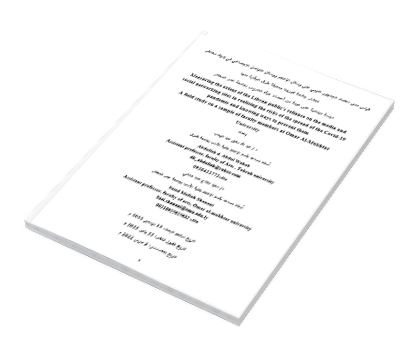Measuring the extent of the Libyan public's reliance on the media and social networking sites in realizing the risks of the spread of the Covid-19 pandemic and knowing ways to prevent them A field study on a sample of faculty members at Omar Al-Mukhtar Un
DOI:
https://doi.org/10.37376/tljmr.vi2.2052Keywords:
Audience adoption, media, social media, COVID-19Abstract
The study aimed to:
- Know the degree to which Libyan public depends on both media and social media in knowing Covid-19 pandemic, awareness of its dangers, and awareness of methods of prevention.
- Know the degree of confidence of Libyan public in both media and social media as a source of information about Covid-19 pandemic.
- Identify kinds of mass media from which Libyan public get their knowledge about Covid-19 and ways of protection from its dangers.
- Identify degree of Libyan public confidence in the information from mass media on Covid-19 pandemic.
- Identify the degree to which Libyan public trusts in the information from social media on Covid-19.
- Identify differences of statistical significance between gender of Libyan public and kinds of media on which they depend to get their knowledge about Covid-19 pandemic.
- Identify differences of statistical significance between gender of Libyan public and their degree of confidence in mass media on which they depend to get their knowledge about Covid-19 pandemic.
The study has come to a set of results, the most important of which are:
- All respondents showed full knowledge of Covid-19's dangers on human race.
- 58% of the respondents depended on social media to get their information about Covid-19, meanwhile only 39% depended on mass media.
- 52% of the respondents depended on mass media as a source of news about Covid-19.
- 60% of the respondents depended on social media as a source of news about Covid-19.
- International TV channels were the first choice of 58% of the respondents who depended on mass media as a source of news about Covid-19.
- 55% of the respondents depended on local radio stations as a source of information about Covid-19.
- 86% of the respondents depended on Facebook social website as a source of information about Covid-19.
- 64% of the respondents showed their high confidence in what TV channels present about Covid-19, compared with the rest of mass media.
- 77% of the respondents showed high confidence in information presented by Facebook social website about Covid-19, compared with the rest of social media.
- The study revealed differences of statistical significance between gender and kind of mass media on which the respondents depend to get knowledge about Covid-19.
- The study revealed no differences of statistical significance between gender and confidence in mass media.
Downloads









